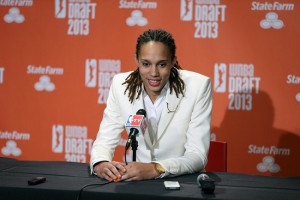With the recent string of gay legal victories coupled with the announcement of several sports figures coming out, the WNBA has announced a new marketing campaign aimed squarely at the LGBT community, reports the Associated Press. “Amid a surge of public opinion in favor of gay rights in the U.S., the WNBA is launching a campaign to market the league to the LGBT community, becoming the first pro sports league to specifically recruit gay, lesbian, bisexual and transgender fans to its games.”
WNBA president Laurel Ritchie, in making the announcement, acknowledged that a confluence of factors – societal and legal changes, a new generation of pro-gay advocates of equality, and an overall sense that sports franchises are finally embracing the reality of gay players and fans – made the move a no-brainer. “For us it’s a celebration of diversity and inclusion and recognition of an audience that has been with us very passionately. We embrace all our fans and it’s a group that we know has been very, very supportive. I won’t characterize it as ‘Why did it take so long?’ For me it’s been we’ve been doing a lot of terrific initiatives. The piece that’s different this year is unifying it.”
The campaign, which begins with the debut of a Web site Wednesday, includes having teams participate in local Pride festivals and parades, working with advocacy groups to raise awareness of inclusion through grassroots events and advertising with lesbian media. A nationally televised Pride game will take place between Tulsa and Chicago Sunday, June 22. All 12 teams will also have some sort of Pride initiative over the course of the season.

Brittney Griner, who is one of a handful of WNBA athletes who have publicly identified themselves as lesbian, was happy the league was embracing the community. Griner, who was the No. 1 pick by the Phoenix Mercury in the draft in 2013, plans on wearing rainbow-colored shoes during the month of June in support of the initiative. “We’ll pave the way and show its fine and there’s nothing wrong with it. More sports need to do it. It’s 2014, it’s about time,” said Griner, who served as grand marshal of the Phoenix Pride Parade last season.
“For a long time they were happy to have those lesbians fill those seats in the stands, but not willing for a long time to embrace the fan base,” said Pat Griffin, professor emeritus in the social justice education program at the University of Massachusetts Amherst. “I attribute that to the homophobia, fear that somehow acknowledging the fan base would encourage other fans not to go to games. What they’ve learned is that the fan doesn’t keep other people from going to games.”











